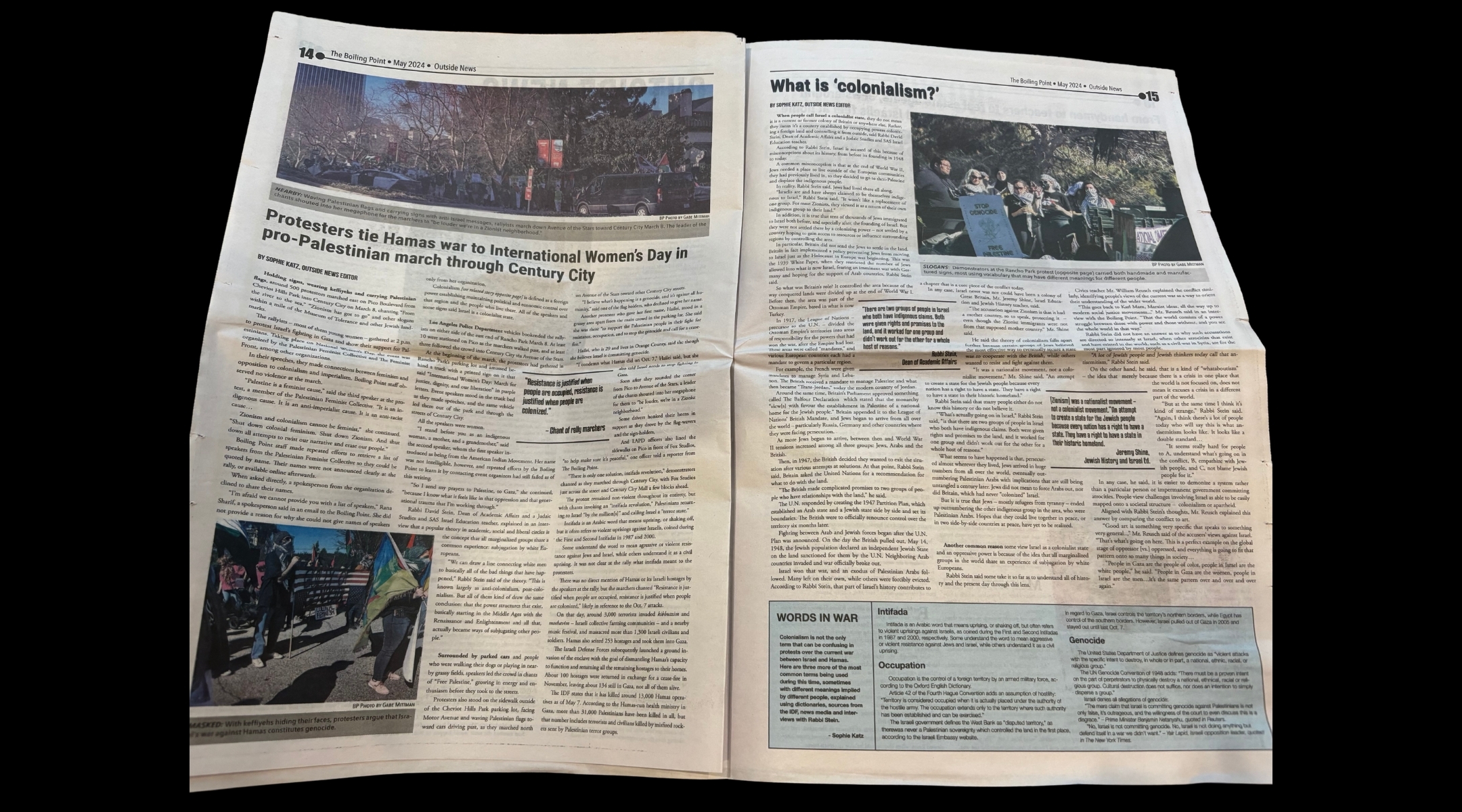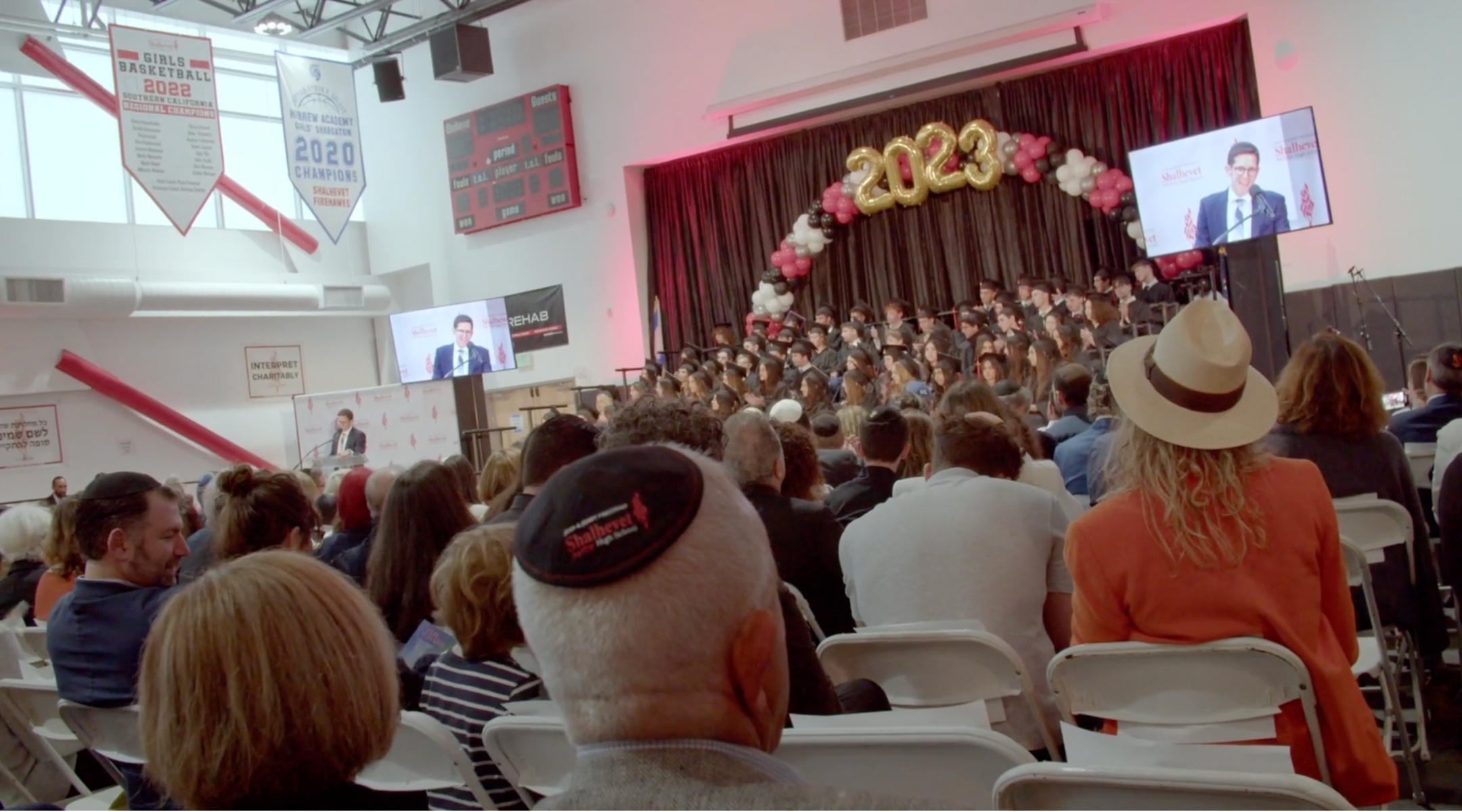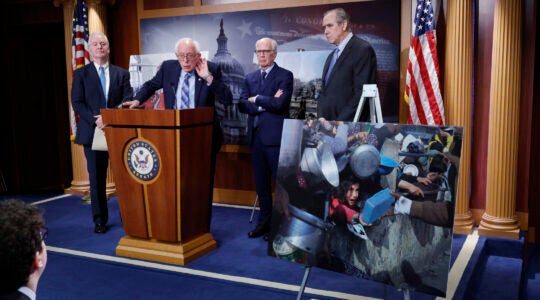Student journalists from Los Angeles’ Shalhevet High School spent Friday bouncing among restaurants and neighborhood stores, but they weren’t out reporting.
Instead, they were removing stacks of their school newspaper and leaving a new, shorter edition behind after the co-ed, Modern Orthodox day school’s rabbi demanded that they retract an article about anti-Israel sentiment.
The student staff at the Boiling Point newspaper pride themselves on engaging neighborhood readers by stretching the bounds of high school journalism. The paper has covered local reaction to the war in Ukraine and the U.S. withdrawal from Afghanistan; five of its articles were recently cited for awards by the American Jewish Press Association, where it competes against non-student publications and web sites.
So the decision to report on a pro-Palestinian protest that included local teens fell squarely within the paper’s mandate, its student leaders and faculty advisor concluded. Yet after they quoted speakers accusing Israel of colonialism and genocide, Shalhevet’s principal ordered that the entire paper be taken out of circulation in what advisor Joelle Keene said was a striking change of pace.
“I’ve completed 21 years as the faculty advisor for the Boiling Point, under, I think four or five heads of school,” said Keene, who herself picked up papers from a local synagogue during a 5:45 a.m. prayer service. “There have been difficult stories and difficult moments and conflicts and that sort of thing. We’ve always been able to work them out.”
The offending edition that went to print was not the first recent story in the student newspaper that caused Rabbi David Block, Shalhevet’s head of school, to intervene. A story in April that included interviews with local Muslim teenagers offering their perspectives on the Israel-Hamas war was published to the Boiling Point’s website, then removed at Block’s instruction and not included in print. (It remains available in archived form online.)
The newspaper published a story about the latest incident, quoting Block as saying that he believed the coverage could reflect negatively on Shalhevet. The story referred to Instagram comments saying that the paper was giving pro-Palestinian activists a “platform for misinformation and hate.”
“My feeling is that this article would both give people the wrong impression about Shalhevet, and because they make snap judgments, it would have very serious implications for whether they’re going to consider sending the next generation of people who should be Shalhevet students to Shalhevet,” Block told the newspaper.
The saga is testing the limits of student journalism at a Jewish day school that aims to pair academic inquiry with a strong ideological grounding in Orthodox Jewish values and support for Israel. It also illustrates a dilemma Jewish day schools have grappled with for years: Can students be exposed to differing viewpoints on Israel while still being taught to love the country? How much — if at all — should they hear pro-Palestinian perspectives in school?
Those questions have simmered for some time — in 2014, the principal of the Ramaz School in New York disinvited the Palestinian historian Rashid Khalidi after a student group invited him — but have grown more acute during the current Israel-Hamas war, as anti-Israel and pro-Palestinian sentiment are widely expressed in public. The rhetoric and displays have made many pro-Israel Jews uncomfortable, and some have sought to penalize institutions, particularly colleges, that have allowed the sentiment to be aired.
According to the Boiling Point, the first censored story elicited negative comments before it was removed from the website, including one that said, “Absolutely disgusting that our Zionistic Modern Orthodox School would post something like this. Am Yisrael Chai.”
Keene, who in addition to teaching at Shalhevet is the founder of the Jewish Student Press Association, said student journalism offers a strategy for cutting through the crisis.
“For journalists, when you have something this horrible that’s happening in the world, your go-to response is: interview, get more facts, understand more deeply,” Keene said. “That’s what we do. That’s me, that’s my students. That may not be the leadership of the school of any given school, or the funders or of parents of younger students, as Rabbi Block said was a problem.”
Block, who has been Shalhevet’s head of school since 2019, did not respond to requests for comment. Multiple student editors at the newspaper also did not respond to requests for comment.
Their views were reflected in the Boiling Point story about the censorship. Tali Liebenthal, co-editor in chief, told the paper she understood Block’s perspective but disagreed with the censorship.
“Everyone is grieving. We are grieving the fact that there are people in this world who think that we are murderers and that we are genocidal,” she said.
“When I have to speak to people who disagree, who genuinely believe we are committing genocide, who think that Israel does not have a right to exist — that is very painful for me,” Liebenthal added. “But I think that it is a pain that is inescapable today, and I don’t think that the Boiling Point has any responsibility to shield our readers from that pain.”
Both censored articles, about the Muslim teens’ views and about the pro-Palestinian demonstration, were written by sophomore Sophie Katz, outside news editor of the Boiling Point. (Katz also produced a glossary about terms commonly used in protests, including “colonialism” and “intifada,” that reflected Shalhevet teachers’ perspectives and was not censored.)

A copy of the Boiling Point’s censored issue, which students were instructed to collect from newsstands. (Courtesy)
Katz, who spent three months gathering interviews for the first article about Muslim teens’ views on the war, could not be reached for comment but spoke extensively in the Boiling Point article about the censorship.
“The fact that I interviewed a person who is anti-Israel and wrote their opinion in an article does not mean I endorse or agree with anything that person said,” Katz told the Boiling Point. “The Boiling Point operates as a real newspaper, meaning what we publish does not reflect the opinion of Shalhevet, nor does it reflect the opinion of the writer.”
Katz told the Boiling Point that she would not be deterred from covering difficult issues in the future.
“Inevitably, with doing good journalism there will be people who don’t like what you’re doing,” she told the Boiling Point. “But you just have to keep doing it anyway because it’s important.”
Keene, who is retiring this year to focus on the press association aimed at improving journalism at Jewish day schools, said the episode had been an instructive educational experience, even if it had been painful for her and her students.
“I think they’re learning how divided our community is,” she said. “I think they’re learning that journalism has the power to create strong feelings on various sides of any issue.”
JTA has documented Jewish history in real-time for over a century. Keep our journalism strong by joining us in supporting independent, award-winning reporting.






